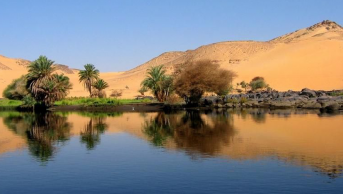A Perfect Platform for Discussing Water Issues: What can Turkey’s Forestry and Water Shura offer to the Middle East?

Islamic world is actually quite familiar to the concept of ‘shura’. Meaning ‘consultation’, shura is an Arabic word, which left an imposing legacy starting from the golden times of the Islamic Empire. Since then, shura is referred to as a great way of decision-making, regardless of the matter in question. For many, the tradition of consultation is one of the basic elements in Islamic public management that demonstrates its compatibility with the modern notion of democracy. A number of experts even linked the decline of the Islamic world against the Western societies –at least partially- to the diminishing value of the tradition of shura. Now, after several millennia from the first Shura in the Middle East, it is high time to get back to basics.
In its original form, shura was a small consultative body assisting a leader. Its existing dates back to pre-Islamic era. As a tribal rule, decisions are taken after a process of consultation to elderly people. However, it would be appropriate to say that shura tradition reached its zenith in the first decades of the Islamic Empire. Starting with Prophet’s life, shura became a compulsory procedure, because of the fact that even the highest authority, the Prophet himself was ordered to consult with other believers (Surah Al-i Imran, 159.). Besides, in accordance with a separate Surah called Shura, consultation is defined as a general procedure among all muslims (specifically Surah Shura, 38.). The tradition of consultation through Shura expanded to new territories as the Islamic Empire expanded.
In a more contemporary and wider understanding, shura is a participatory approach to decision-making. As Turkey’s Forestry and Water Shura exemplified, experts from a diverse range of disciplines (e.g. biology, agriculture, sociology, international relations), along with public officials of different organizations and ranks were all invited in order to reach decisions that can be transformed into concrete actions. The diversity of memberssecured a multidisciplinary and an unbiased dialogue, something which I have witnessed personally. The diversity of membership was made compulsory by the Shura Directive, which lists the main groups to be represented, such as ministries, relevant public authorities, universities, professional unions, non-governmental organizations, private sector representatives, prominent experts on forestry, water, meteorology and natural protection. All members of Shura had equal voting rights, a principle which prevented blocking minorities and encouraged a more ‘flat’ discussion. The total number of members and participants were more than half-a-thousand. During the course of the Shura, more than one-hundred policy-relevant decisions were adopted. Furthermore, with an aim of elaboration of the adopted decisions, the Shura also defined hundreds of strategies and policies. Therefore, the Shura drafted a comprehensive guidance document in all aspects of water and forestry policy. Finally, the Shura decisions will be officially published following a ministerial approval, and duing the follow-up period, outcomes of the decisions will be closelyscrutinized.
Turkey’s first Forestry and Water Shura convened in 2013. The legal basis of the Shura was initially stated in the Decree Law No. 645 (Article 21.a.), which also established the Ministry of Forestry and Water Affairs in 2011. Relying on this legal basis, a Directive was published by the Ministry of Forestry andWater Affairs in 2012. After several years, with notable improvements, it convened for the second time on May 5-7, 2017. Shura members were divided into five separate thematic commissions in order to facilitate a more to-the-point discussion. These includea) water, b) forestry, c) climate and meteorology, d) nature protection and biodiversity, and e) fight with desertification and erosion. However, it should be noted that the final meeting of the Shura (May 5-7) was only the tip of the iceberg, so to speak. Shura process entailed a lengthy (lasting more than six months) but very successful and valued preparatory stage. During this phase -which consisted two to three meetings of each ‘’committee of expertise’’-the first version of the decisions began to materialize.
In brief, with all these dimensions, shura appears to be a timeless framework, benefits of which continue to be substantial. Turkey’s evolving shura experience on water affairs is an outstanding example of this. Thinking of the protracted water related issues in the Middle East, Shuras may provide a traditional yet effective structure for discussion of water issues that countries of the region share. They may enhance public decision-makingpractice via guiding higher authorities with the most recent scientific findings, but also -perhaps more importantly-with the most advanced consensus-based opinions. With these in mind, for creation of a better and trust-based atmosphere of dialogue over the water challenges, Turkey’s Forestry and Water Shura, thus, deserves a closer analysis. It proves that the tradition of shura is an ‘old but not obsolete’ standard for improved decision-making processes.









